
English | 中文

ESG and supply chain management
source:goldencsr date:2022-12-12 11:10:18· ESG is not a substitution of CSR. Instead, it is a reinforcement of key issues of CSR related to the environmental, social and governance topics.
· Emerging ESG issues such as carbon and water management have a profound impact on the supply chain management.
· The UN Sustainable Development Goals and ESG goals cannot be achieved without the overall synergy of the supply chain.
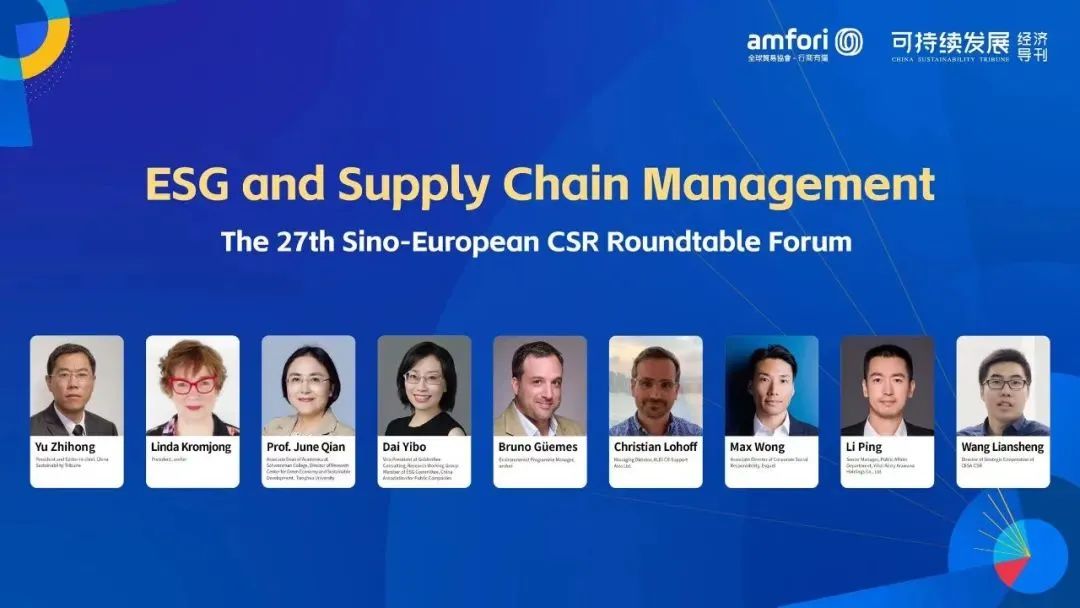
On December 1, 2022, the 27th Sino-European CSR Roundtable Forum, organized by amfori and China Sustainability Tribune, was held online in Beijing.
Focusing on “ESG and supply chain management”, the forum invited well-known company representatives, sustainability experts, brands and suppliers to share ESG policies, standards and supply chain management practices, with the purpose of helping enterprises reduce potential risks such as international trade, policy, climate, and industrial transformation towards sustainable supply chains.
| An inexorable trend: applying ESG in supply chain management
ESG, (Environmental, Social and Governance) is a concept that is being increasingly adopted by financial institutes, international organizations and their supply chain actors to monitor, manage and address the risks in their supply chain. Meanwhile, other challenges have emerged, including soaring energy prices, inflation in commodities caused by the supply chains disruption and geopolitical conflicts. All have an adverse impact on the global economy and the UN Sustainable Development Goals.
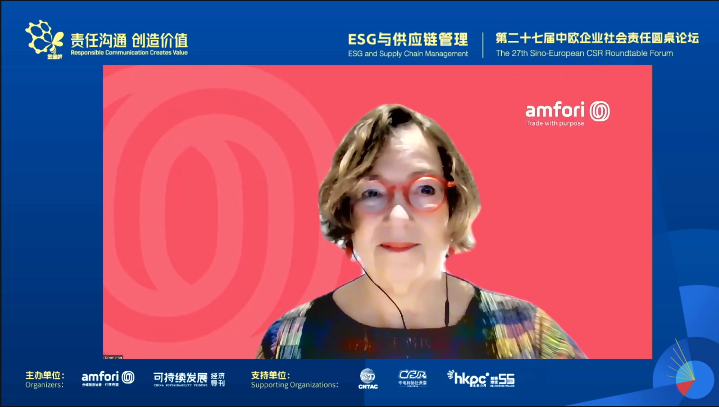
Against this background, Ms. Linda Kromjong, President, amfori introduced amfori’s coping strategy. Taking ESG as a starting point, amfori has enhanced supply chain actions based on amfori BSCI, amfori BEPI and amfori QMI from the perspectives of society, environment and quality control. At the end of her welcoming speech, Linda also expected to make ESG a key role in enhancing supply chain resilience and promoting the sustainable development of China-EU trade.
During the keynote speech, Prof. June Qian, Associate Dean of Academics at Schwarzman College, Director of Research Center for Green Economy and Sustainable Development, Tsinghua University, interpreted the relationship of ESG and supply chain management from three aspects, namely, “development of ESG”, “supply chain management: why bother?”, “supply chain management: how?”
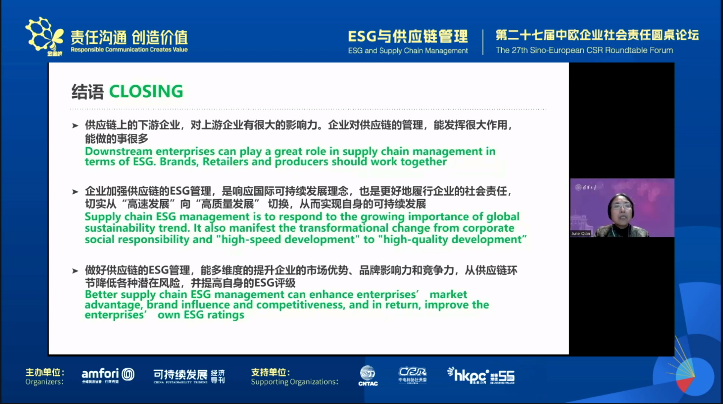
The Report to the 20th CPC National Congress said that a green and low-carbon economy and society are crucial to high-quality development. Taking carbon reduction as an example, Prof. Qian explained the importance of supply chain management. She suggested to understand the international and national ESG schemes and its structure & rating system, work together with suppliers by exercising influence power and make ESG go through the whole process of supply chain management, which will help businesses to improve their ESG performance and realize the transformational change from corporate social responsibility and "high-speed development" to "high-quality development”.
| Effective tools: ESG disclosure and assessment system
In Europe, a series of ESG-related directives have been introduced in the last two years. There are directives on ESG and sustainability disclosure, such as the Corporate Sustainability Reporting Directive, and also key areas and issues related to ESG disclosure, such as the EU Climate Law. Those policies indicate the importance of ESG in China-EU business communication.
In her keynote speech, Ms. Dai Yibo, Vice President of GoldenBee Consulting, Research Working Group Member of ESG Committee, China Association for Public Companies, analyzed the impact of ESG standards as well as guidelines and standards on information disclosure in Europe and China on Chinese companies in the global value chain through accurate data and charts.
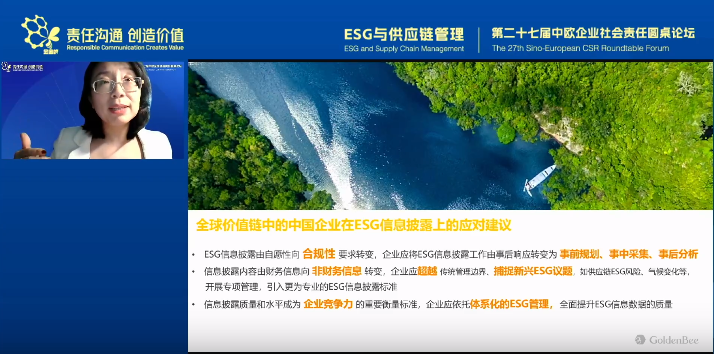
As to a matter of great concern, that is, how Chinese companies in the global value chain can better improve ESG disclosure, she put forward three suggestions. First, companies should shift ESG disclosure from post-event response to pre-event planning, mid-event collection and post-event analysis. Second, they should put emphasis on and introduce more professional ESG management and disclosure, such as ESG risks in supply chain, to enhance supply chain resilience. Third, they should harness the systematic ESG management to comprehensively improve the quality of ESG information data.
Based on amfori’s exploration, Mr. Bruno Güemes, Environmental Programme Manager, amfori, shared the effectiveness of amfori ESG policies and tools under the philosophy of Trade with Purpose.

He focused on the three tools of amfori: founded in 2003, BSCI enables companies to drive sustainability by setting up the social due diligence principles that business enterprises strive to implement in their global supply chain; BEPI is a practical and collaborative framework which enables companies to respond to key environmental issues and drive improvements in their supply chains; QMI(Quality Management Initiative) is an initiative for companies committed to give professional guidance and assessment tools for manufacturing practice and quality management in the production sites and has been launched in China in 2022.
| Leading practices: promoting the ESG management of supply chains
Supply chain is the key step running through economic and industrial development. Against the drastic global changes, how to improve the sustainability of the supply chain has become an important topic, and the rise of ESG provides a breakthrough for this problem.
Mr. Christian Lohoff, Managing Director, ALDI CR-Support Asia Ltd. shared the multinational discount supermarket chain ALDI’s practice in promoting ESG management o supply chains. He introduced the concerns of ALDI on reducing greenhouse gas emissions, producing sustainable packaging and mitigating salient supply chain risks from three aspects of ESG. He concluded that at ALDI, ESG does not simply stay at the strategic level, but is embedded into the corporate culture, exerting the power to inspire employees and transform the company.
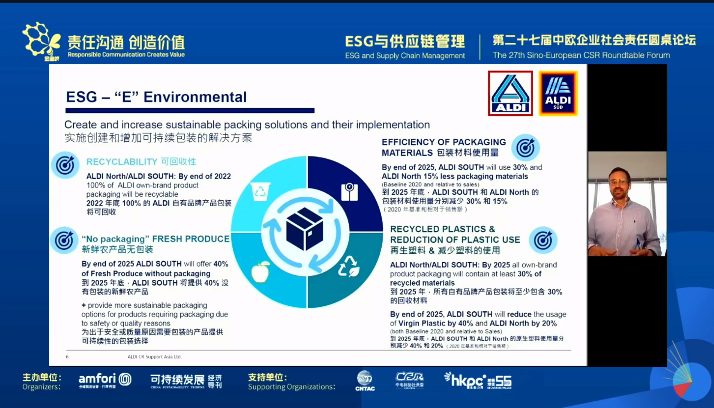
In the ensuing panel discussion, he said that the ESG concept cannot be discussed without neglecting its development process. In the past ESG topics was mainly driven by customers and civil society in European/US markets. Therefore, giving full play to the synergy between enterprises and industries is essential to extend the ESG management of the supply chain.
How to implement ESG program? Esquel, a knowledge-based innovation company, thinks it comes from trust and respect. With the mission of “Fun People Serving Happy Customers”, Esquel believes that happy staff is the premise of satisfied customers.
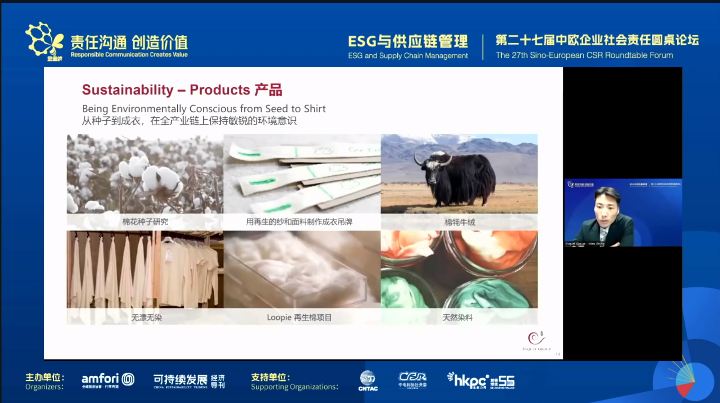
Mr. Max Wong, Associate Director of Corporate Social Responsibility, Esquel, introduced the company’s sustainability strategy from the aspects of planet, product, people and community with the goals of “tackling climate change, net zero emissions, and narrowing the wealth gap, indicating the company’s ESG pursuit of human-nature harmony. The participants were refreshed by his sharing about the waterless dyeing and sustainable garden. He also explained the technologies and models involved in the panel discussion.
In the panel discussion, company representatives shared their views on how ESG can improve sustainability in the supply chain.
Mr. Li Ping, Senior Manager, Public Affairs Department, Yihai Kerry Arawana Holdings Co., Ltd., started with the circular economy. Combining his company’s circular economy model, Mr. Li explained the inseparable relationship between the circular economy and the supply chain in the whole industry chain. He said that the company's practice proves that the development of the circular economy model can truly achieve sustainable corporate development while maximizing the ecological protection. At the same time, by turning by-products into treasure, Yihai Kerry significantly increases the value of the whole industry, and then in turn benefits itself. It gives Yihai Kerry more edge without imposing additional burden on them.
Mr. Jason Wang, Director of Strategic Cooperation of CESA-CSR, elaborated on the importance of ESG management of supply chains for the development of the ICT industry and how industry organizations should play a role in providing relevant professional services for enterprises. In this regard, he suggested brand owners/buyers, supply chain enterprises and industry organizations from the three perspectives: to conduct pilot projects and make gradual planning and implementation; to introduce ESG elements that are suitable for enterprises; to conduct relevant research and technology transformation.
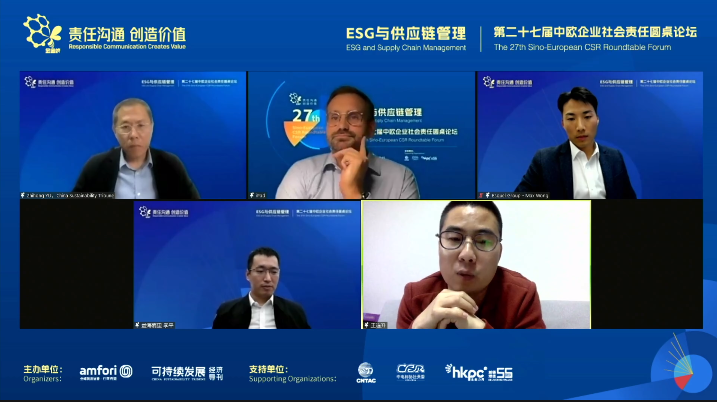
In the end, Mr. Yu Zhihong, President and Editor-in-chief, China Sustainability Tribune, summarized the forum, such as the role of ESG in supply chain management, the establishment of ESG standards and guideline tools, and the synergy benefits of industry enterprises.
Mr. Yu said that the trend of mainstreaming ESG is moving faster, judging from the perspectives of policy, standards and guidelines and corporate practices. Besides, he stressed that the impact of ESG on supply chains and emerging ESG issues should not be underestimated. The industry guidelines must also keep up with the relevant demand. Looking ahead, in the future, there will be more tools applied to supply chain management with the establishment of relevant standards. Of course, this cannot be done without the joint promotion of the government, academia and the industry.
The Forum provided a live streaming channel on the internet with nearly 218,000 viewers. As a professional and practical communication platform and channel for corporate social responsibility (CSR), the Sino-European CSR Round Table Forum has focused on the building of responsible supply chain for many years, covering related topics such as employee care, harmonious labor relations, good communication mechanism and partnership between buyers and suppliers. Held 26 times in the past years, it has been well received by stakeholders and conducted with great support from participants, including relevant Chinese government departments, CSR organizations as well as Chinese and European enterprises.


Please scan the QR codes to replay the video (left) and check speaker profiles (right).